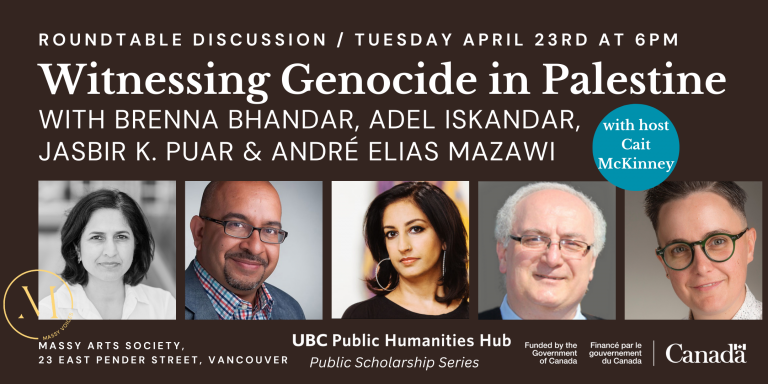
The Genocide Convention of 1948 defines genocide as “a crime committed with the intent to destroy a national, ethnic, racial or religious group, in whole or in part.” The International Court of Justice recently determined that Israel’s actions in Gaza could plausibly amount to genocide, and the court has ordered Israel to take all possible measures to prevent genocidal acts. Since the siege on Gaza began lawyers, poets, politicians, journalists, and scholars have openly stated that we are witnessing a genocide. As part of our public scholarship series, we are hosting a roundtable of humanities experts who can speak to the ongoing genocidal contexts happening in Palestine. Experts will reflect on modes of witnessing — journalism, social media, trial and testimony, and other forms of cultural production — and consider what it means to bear witness to such devastation under threats of censorship, denial, erasure, and suppression.
This event is co-hosted by Massy Arts Society, Massy Books, and the Public Humanities Hub as part of our Public Scholarship Series.
Tuesday, April 23, 2024
6:00 – 8:00 PM
Massy Arts Society
Parking is extremely limited near Massy Arts, which is located in Chinatown in the Ming Wo building (23 E Pender St). The nearest parking garage is located a block and a half away at Chinatown Plaza (Keefer St & Quebec St). Please plan accordingly.
Please see the registration page for more information on venue accessibility.
Register for in-person (SOLD OUT)
UPDATE: Due to demand, we have opened up a livestream option for this event. Please note the livestream will be a limited broadcast with no chat or Q&A function. Thank you for your understanding.
Discussants
Brenna Bhandar, Associate Professor, Peter Allard School of Law, UBC works as an educator on the unceded and ancestral lands of the Musqueam, Tsleil-Waututh and Squamish First Nations. She is author of Colonial Lives of Property: Law, Land and Racial Regimes of Ownership (Duke University Press: 2018); and co-editor with Rafeef Ziadah of Revolutionary Feminisms: Conversations on Collective Action and Radical Thought (Verso, 2020).
Adel Iskandar, Associate Professor of Global Communication, SFU is a public scholar whose work deals with media, identity and politics. Iskandar’s engaged participatory research includes supporting knowledge production through scholarly digital publishing such as “Jadaliyya” and academic podcasting such as “Status.” His community research agenda involves showcasing local grassroots participatory creative production by communities in the Middle East to confront the rise of extremism.
Jasbir K. Puar, Professor, Institute for Gender, Race, Sexuality and Social Justice, UBC is the author of the award-winning books The Right to Maim: Debility, Capacity, Disability (2017) and Terrorist Assemblages: Homonationalism in Queer Times (2007). Her articles have been published in journals such as Social Text and South Atlantic Quarterly, mainstream venues such as Al-Jazeera and The Guardian, and translated into more than 15 languages.
André Elias Mazawi, Professor, Department of Educational Studies, UBC is a sociologist of education. His academic interests are in the areas of the cultural politics of schooling and higher education, the intersections between colonialism and education, with particular attention to the effects of privatization and geopolitics on schooling and educational policies, school governance, and school-higher education restructuring in the Arab region.
Moderator
Cait McKinney, Assistant Professor, School of Communication, SFU works broadly in the field of queer media studies that centres the work of queer people and their visions of justice and methodological and theoretical approaches to media studies that draw from queer theory. They focus primarily on how queer social movements use digital technologies to share information and consider how queer information activism helps us rethink issues of accessibility, data-management, and participation in networked media environments.